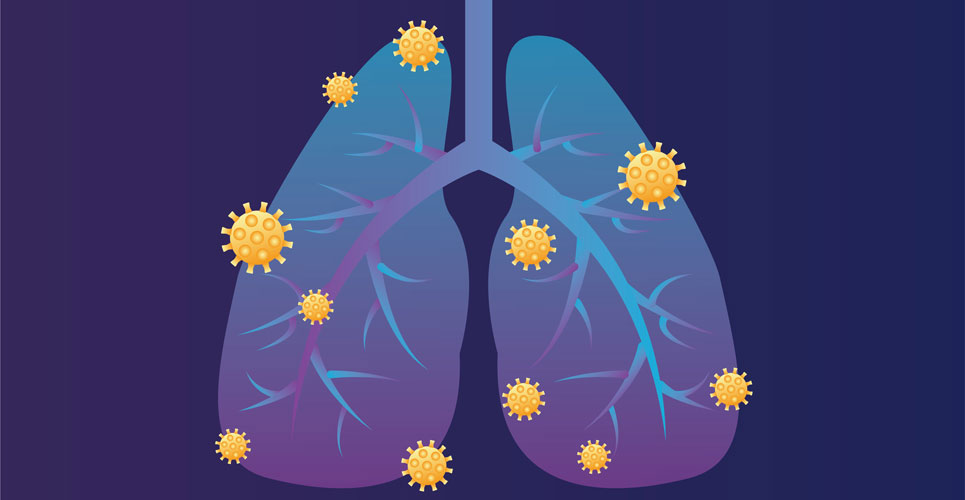Since the coronavirus emerged in 2019, a significant amount of information on many aspects of the virus has been reported in the medical literature.
One important area has been a description of the clinical characteristics of those infected with the virus and this information has helped government define groups of patients who are perceived as vulnerable to the virus and advised to “shield”. Several of the early studies from China identified the most common comorbidities among those infected with COVID-19. For instance, in the first reported case series of 140 infected patients, hypertension (30%) and diabetes (12.1%)1 were the most common comorbidities and other retrospective studies came to the same conclusion.2,3 One co-morbidity which is intriguingly absent from the list is asthma and in the study by Zhang et al,3 only a single patient was reported to have the condition. It is possible therefore that patients with asthma are somehow protected from COVID-19?
It is perhaps surprising that asthma does not feature as a common co-morbidity for those with COVID-19. In 2002 a study comparing the incidence of rhinovirus infection (such as those which cause the common cold), showed that while asthmatics were not particularly at a higher risk of infection, once infected, the illness occurred more frequently and was more severe than for non-asthmatics.4 Other work has also revealed that the degree of asthma control at the time of infection is also an important contributory factor in the subsequent response to infection. For instance, where a patient’s level of disease control is poor, they tend to experience a more severe exacerbation in response to a viral infection.5 A further problem which particularly affects asthmatics, is that after infection with a rhinovirus, the normal innate immune response which causes induction of interferons and an apoptotic response in virally infected cells, is severely impaired.6
It therefore seems puzzling that asthmatics are apparently note at a higher risk of infection with COVID-19. Allergic diseases such as asthma are characterised by a T helper-2 (Th2) response and enhanced expression of immunoglobulin E (IgE) and there is emerging evidence that interferons can suppress the Th2 allergic response.7 In fact, studies have suggested that interferon treatment can result in improvements in patients with severe asthma.8 However, since interferon production in asthmatics is impaired how might this serve to protect against infection with COVID-19? One theory suggests that the protective effect arises not through the suppression of interferons but precisely the opposite, that is, as a consequence of the enhanced Th2 response although the authors offer no plausible explanations as to why this might be protective.9 One possible explanation relates to how COVID-19 is believed to enter cells.

Evidence suggests that COVID-19 uses angiotensin-converting enzyme 2 (Ace-2) as its cellular receptor.10 In a study examining whether Ace2 expression was reduced in airway cells from patients with asthma and respiratory allergy, it was found that such patients did indeed have lower levels of Ace-2.11 Additionally, some data suggest that the enhanced Th2 inflammation in asthma also reduces expression of Ace-2 leading to better outcomes in those infected with COVID-19.12 Alternatively, it might be due to the effects of treatment with some preliminary and yet to be reviewed data, indicating that the inhaled corticosteroid, ciclesonide, blocks coronavirus replication.13
In summary, the evidence to date indicates that asthma is not an independent risk factor for COVID-19 infection because of a possible protective role that arises from the Th2 inflammation which downregulates Ace-2 expression. Nevertheless, asthmatics should not consider themselves immune from infection as witnessed by a large UK study in which 14.5% of 17,535 patients hospitalised for COVID-19 were asthmatic.15 With a potential protective effect against COVID-19 from inhaled corticosteroids, patients with asthma should continue to use their regular treatments to help maintain disease control.
References
- Zhang JJ et al. Clinical characteristics of 140 patients infected with SARS-CoV-2 in Wuhan, China. Allergy 2020; Feb 19 doi: 10.1111/all.14238.
- Zhou F et al. Clinical course and risk factors for mortality of adult inpatients with COVID-19 in Wuhan, China: a retrospective cohort study. Lancet 2020;395(10229):1054-62.
- Zhang JJ et al. Distinct characteristics of COVID-19 patients with initial rRT-PCR-positive and rRT-negative results for SARS-CoV-2. Allergy 2020; Apr 13; 10.111 doi: 10.1111/all.14316.
- Corne JM et al. Frequency, severity and duration of rhinovirus infections asthmatic and non-asthmatic individuals: a longitudinal cohort study. Lancet 2002;359:831-4.
- Jacksin DJ et al. The influence of asthma control on the severity of virus-induced asthma exacerbations. J Allergy Clin Immunol 2015;136(2):497-500.
- Wark PAB et al. Asthmatic bronchial epithelial cells have a deficient innate immune response to infection with rhinovirus. J Exp Med 2005;201(6):937-47.
- Gonazales-van Horn SR, Farrar JD. Interferon at the crossroads of allergy and viral infections. J Leukoc Biol 2015;98(2):185–94.
- Simon HU et al. Clinical and immunological effects of low-dose IFN-alpha treatment in patients with corticosteroid-resistant asthma. Allergy 2004;58:1250-5.
- Carli G et al. Is asthma protective against COVID-19? Allergy 2020;May 25 DOI: 10.1111/all.14426.
- Jia HP et al. ACE2 receptor expression and severe acute respiratory syndrome coronavirus infection depend on differentiation of human airway epithelia. J Virol 2005;79:14614–21.
- Jackson DJ et al. Association of respiratory allergy, asthma and expression of the SARS-CoV-2 receptor ACE2. J Allergy Clin Immunol 2020; Apr 22 doi: 10.1016/j.jaci.2020.04.009.
- Sajuthi SP et al. Type 2 and interferon inflammation strongly regulate SAR-CoV-2 related gene expression in the airway epithelium Bio Rxiv 2020; Apr 10 doi: 10.1101/2020.04.09.034454.
- Matsuyama S et al. The inhaled corticosteroid ciclesonide blocks coronavirus RNA replication by targeting viral NSP15. bioRxiv 2020;doi: 10.1101/2020.03.11.987016.
- Docherty AMet al. Features of 20, 133 patients in hospital with covid-19 using the ISARIC WHO clinical characteristics protocol: prospective observational cohort study. BMJ 2020;369: doi: https://doi.org/10.1136/bmj.m1985

